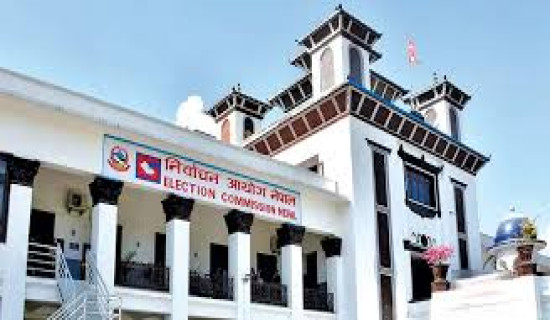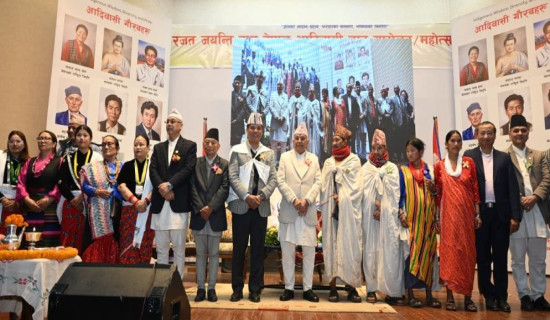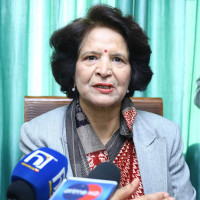- Monday, 9 February 2026
Hindu Kush Himalaya is resource hub: President
Lalitpur, Dec. 6: President Ramchandra Paudel has said that the Hindu Kush Himalayan region is a crucial asset not only for this region, but also for the entire world – in terms of sources of food, energy, water, and cultural and biological diversities.
One-fourth of the world’s human lives are dependent on the environmental services that come from the Hindu Kush Himalaya (HKH), the President said while inaugurating the 40th anniversary of the International Centre for Integrated Mountain Development (ICIMOD) in Lalitpur on Tuesday.
This is a testament to how important it is to conserve this region, President Paudel added.
“We know that the world today is in crisis attributable to anthropogenic climate change, biodiversity loss, and environmental pollution. The impact of climate change is even more pervasive in mountainous regions like the Hindu Kush Himalaya, with its fragile mountainous topography
President Paudel said, “Given this situation, a big challenge lies ahead of us. There is a need to mitigate the impacts of climate change and make the lives of the people of this region easier. Climate change-induced incidents – snowmelt and glacial lake flood outbursts in the Himalayan region, landslides in the hilly areas, and floods in the southern plains – are causing great damages to the economy, environmental system, and humanity as a whole.”
According to the President, although countries like Nepal have contributed little to greenhouse gas emissions and climate change, the impact we face due to climate change is higher. “I would like to take this opportunity to note that a couple of weeks ago, during the visit of the UN Secretary-General to Nepal, I had requested him to draw the world’s attention to the impacts of climate change that Nepal is facing, even though it hasn’t contributed much to total carbon emissions,” he added.
The effects of climate change and the environmental and biodiversity loss in this region do not remain within national borders. Rather, they spread across and beyond borders, and are making global impacts. “Therefore, we, the member states, should work together to solve these problems. I call upon all concerned parties to raise our issues unanimously at the international level,” President Paudel said.
“In this light, I believe that ICIMOD, which has been developing an action plan and mechanisms to foster strong regional and international cooperation to combat the problems caused by climate change, will pay more attention to making national and regional strategies and an action plan that ensures resources for their successful implementation,” he said.
Nepal is and always has been committed to the institutional development of ICIMOD and the sustainable development of the entire HKH region. Nepal’s support for ICIMOD will continue as well, President Paudel said.
During the programme, the Director General of ICIMOD, Pema Gyamtsho, said, “ICIMOD’s 40-year legacy is a testament to our resilience and the collaborative efforts of our partners. We’ve addressed diverse challenges, enabling sustainable development in the HKH. As we move forward, our ambition remains high, guided by the lessons of the past.”
Importantly, this moment marks an opportunity to consolidate urgent actions for the future in the context of the triple planetary crisis of climate change, pollution and biodiversity loss, he added.
Under the theme “Moving Mountains 2030”, the event highlighted the journey and its commitment to shaping the future of the HKH region. The 40th-anniversary agenda included a series of key moments, showcasing achievements and the enduring partnerships that have fuelled its success.
President Paudel also released a memorial book highlighting four decades of ICIMOD’s contributions.
‘Dr. Andreas Schild Memorial Mountain Prize’ was also announced at the programme. The Mountain Prize sets out to amplify the voices of those on the front lines of the climate crisis in the HKH, recognising outstanding individuals and groups actively engaged in on-the-ground sustainable solutions. This year’s winners were Sathi Eco Innovation India Pvt Limited and Rupani Foundation Pakistan (RFP).
Bhutan’s Advisor for the Ministry of Agriculture and Livestock and Governor of the Royal Monetary Authority, Dasho Penjore, and high-level representatives from other member countries of ICIMOD – Bangladesh, China, India, Bhutan, Nepal and Pakistan also participated in the function.
Attendees also included ICIMOD’s Board and Support Group members from the region and beyond, as well as the diplomatic corps based in Kathmandu.








-square-thumb.jpg)








